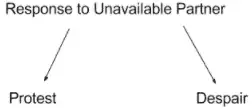Chronic stonewalling is something that can gradually chip away at your happiness, and relationship, and if it’s not resolved in a healthy way, it can end up ruining the relationship for good.
Have you ever watched a child try to get attention from their mom or dad?
“Pay attention to me.”
“Look at me.”
“Mommy, daddy, watch me.”
But what happens if the child’s attachment figure is unavailable and unresponsive? The child will experience distress.
It doesn’t matter if you are 5 months old or 45 years. There are still two basic responses to an unavailable attachment figure.

When our romantic partner is unresponsive and unavailable, we protest. We act like an infant banging a rattle on the side of the crib. We make as much noise as possible to try and get attention. As adults, we do this by becoming critical, or we make excessive attempts to reestablish a connection.
And if the consistent response is being ignored or dismissed, the child curls up into a ball and hides in the corner. As an adult, we will stop fighting for emotional connection and give up on the relationship altogether.
Despair has set in.
Related: Why Narcissists Use Stonewalling As a Nasty and Powerful Defense Mechanism
A couple was asked to demonstrate this scenario by having one partner intentionally be unresponsive.
Here’s what it looked like:
- Angela: Hey. Hey. [Looking at her partner, trying to get his attention].
- Brendan: [On his phone, not looking at her at all].
- Angela: Hey, I have something I want to talk about. Um, something at work… are you listening? Hey, babe. Love? I’m super upset about something at work and need to talk to you. I can text you. Are you on Facebook? [Touches his back and sighs heavily].
- Brendan: [Continues to look at his phone and is unresponsive].
- Angela: Hey.
This occurred in about 10 seconds. At the end of the demonstration, here is what Angela said when she was asked what she noticed in her body.
Angela: I… um… felt a lot of tension. I was frantic. Panicky. I became super anxious, even though I knew this was an exercise. And towards the end I just felt helpless.
This prolonged sense of turning away is what Dr. Gottman calls Stonewalling.
Avoiding Conflict
Everyone withdraws from a relationship when we are feeling hurt, or fearful of saying the wrong thing. This pause allows us to get creative about how to solve the problem.
But consistent withdrawal is toxic. Most romantic partners do not understand the profound impact distancing has on a bond.
Greg: “I don’t get why she is so pissed with me. I wish I could just shrug off her blaming, but I can’t. I need time to recover. Why doesn’t she get that?”
While Greg is being honest about the internal world of a stonewaller, he also neglects to mention one important fact: that he never wants to resume the discussion, because the emotions he feels are too overwhelming.
If either spouse refuses to communicate when conflict arises, it can be hard to heal a marriage. – Dr. Gottman
Silence Is Deafening
How can doing nothing be so triggering?
When looking at relationships from an attachment lens, this type of response is seen as a threat to survival. Psychologist Ed Tronick demonstrates the effect of stonewalling in a landmark study between mothers and infants called The Still Face Experiment.
This brilliant baby protests the emotional connection to her mother in a variety of ways. He points – he screams – he aggressively moves around in his chair. When these attempts fail, the baby withdraws by moving his face and body away. After a few moments, he starts to wail in a panic. It’s difficult to witness.
When the researcher signals the end of the experiment, the mother smiles and comforts the baby, who rapidly regains his emotional balance and happily re-engages her.
This Still Face experiment applies to our adult relationships too. Each time a partner turns away from connection, a response is not dissimilar to the baby shown above.
The Avoidant Stonewaller
Dr. Gottman’s research highlights that 85% of stonewallers are men. This is due to physiological differences. Men flood with emotion easier than women and struggle to recover as quickly. Men tend to be more avoidant in their attachment styles than women, and stonewalling is the ultimate avoidant strategy.
Stonewalling tends to come from good intentions. The stonewaller is trying not to make anything worse, even though their behavior sends the unintended message of disapproval and emotional distance. The purpose of stonewalling is to self-soothe because they are overwhelmed by negative emotions.
Stonewallers typically have a history of making things worse when trying to solve problems…which is why they have the learned behavior of shutting down.
Related: 4 Toxic Behaviors That Are Ruining Your Relationship
Demanding And Withdrawing
The toxic cycle in which one partner becomes critical and the other stonewalls is a predictor of divorce. It goes like this:
The more you feel criticized, the more you turn away. The more you turn away, the more your partner attacks. Your heart rate escalates, and you’re scared to say anything for the fear of making it worse.
This is what happens when Miguel comes home from work.
- Jane: You’re late again! And you forgot to pick up the groceries.
- Miguel: I did. [Thinks to himself, this is never going to stop. If I tell her I just forgot, she’ll explode. It’s not worth it. Just keep your mouth shut.]
- Jane: So typical.
- Miguel: [Looks away, and stonewalls by not replying.]
- Jane: [Heart rate increases.] You never care about our family.
Miguel may be physically in the room, but he has emotionally disappeared from the conversation. This is done to protect himself from Jane’s harsh criticism so that he can calm down. Unfortunately, the message the partner receives from the behavior is, I am withdrawing from any meaningful interaction with you.
Jane’s distress is amplified by the confusion of having Miguel both physically present and emotionally absent. When stonewalling becomes a habit, it creates a sense of helplessness in the other partner. This is why she attacks even more.
The Other Side Of The Wall
When your partner is stonewalling you, you may feel judged, or that your partner is cold, detached, or superior. Since your partner is unresponsive, you feel they don’t care about your needs or feelings. It’s as if they’ve already abandoned you, even though they are still in the room.
This is where you may become even more critical, and protest for emotional connection. This will push them farther away. Instead, give them space, and then revisit the issue later when you can be gentle. This should always be the way you start the conflict conversation.
Ask them what they need, so you can talk about this in a way they can work with you on it.
Remedies To Stonewalling
Stonewalling is the last horse of Dr. Gottman’s Four Horsemen of the Apocalypse. It takes enough time for the negativity formed by the first three to become so overwhelming that stonewalling is a form of escape.
Want to know more about chronic stonewalling? Check this video out below!
Ask For A Break
When one partner is too overwhelmed and flooded, one of the most successful strategies is to take a break. In fact, this is a very natural and healthy thing to do. With the couples I work with, we come up with a hand signal or a phrase that signals a break is necessary. And we discuss a way in which each partner will effectively calm down for a full 20 minutes before returning to the conversation.
For most couples in conflict, there is little to no engagement once one of them leaves. But avoiding the emotional intensity of conflict postpones healing and blocks the emotional connection.
By saying, “I will be back in 20 minutes,” you’re giving your partner the reassurance that you will return. This reduces their anxiety to continue criticizing you because they know you will return to work through the problem.
During these 20 minutes, intentionally focus on replacing problem-maintaining thoughts such as “my partner is so mean,” with relationship-enhancing ones such as, “my partner is just stressed out and frustrated. We need to work together to find what’s best for both of us.”
Related: 13 Habits Common In All Successful Relationships
Ask For What You Need, Not What You Don’t
When both partners restart the conflict conversation, focus on expressing the positive needs you have. Follow this guide here.
If you’re the stonewaller, do your best to search for the longing in your partner’s words. You can even ask, “what do you need?” This need should be positive and actionable. If your partner is vague and says, “I need you to love me,” you should respond by saying, “I understand you need me to love you. I want to do that too. Tell me, what can I do that would make you feel most loved?”
Express Appreciation
During conflict conversations with your partner, take extra time to share an appreciation for listening and responding. This will help keep the conversation more positive than negative and support the stonewaller from feeling the need to withdraw.
Consistent stonewalling is a sign a relationship is ailing. Take this sign seriously, because when you consistently turn away from your partner, you’re not just avoiding a fight; you’re avoiding your relationship.
And your relationship needs you to thrive.
With love,
Kyle Benson
If you want to transform conflict into a material to build a stronger and more connected relationship then read Kyle Benson’s conflict blueprints here.
Written by Kyle Benson Originally appeared in KyleBenson











Leave a Reply